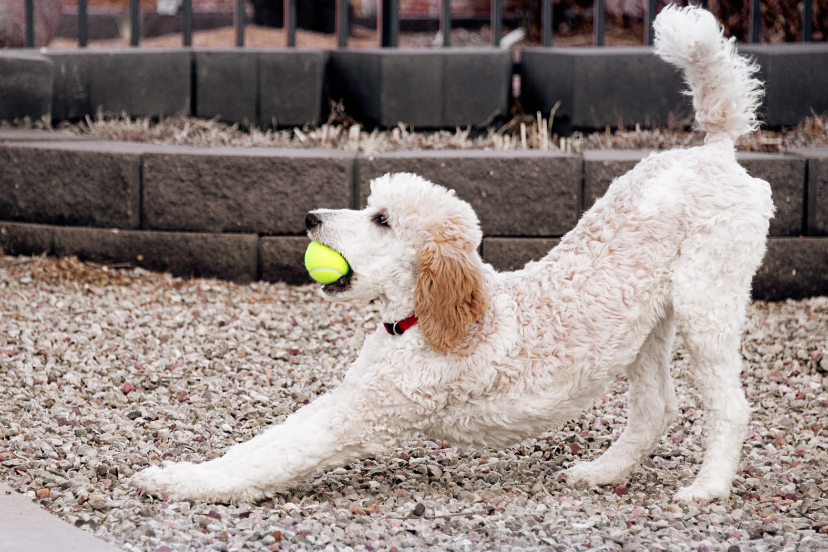Poodles Need Mental Stimulation: Unleashing Your Pup’s Inner Genius
We all know that poodles are a sight to behold with their poise and elegance, but did you know they have brains as remarkable as their beauty? Poodles need mental stimulation, just like we need our morning coffee – it’s the secret sauce to a happy, healthy, and well-behaved pup. In this article, we’re diving nose-first into the world of poodle smarts, exploring the why’s and how’s of keeping their minds engaged, all while having a ball of a time. So, grab your pup’s favorite treat and let’s get those mental gears turning!
Poodles Need Mental Stimulation: Unraveling the Whys
Our four-legged friends have more in common with us than we might think – they too yearn for mental challenges. Here’s why poodles need mental stimulation as much as we need fresh air:
- Preventing Boredom, Curbing Trouble: Ever heard the phrase “idle paws are the devil’s playground”? Well, it holds true. A bored poodle might find mischief in chewing your favorite shoes or redecorating your living room with tissues. Stimulating activities help channel their energy and creativity constructively.
- Enhancing Cognitive Abilities: Poodles are no strangers to smarts – they’re ranked among the most intelligent dog breeds. Engaging their minds through puzzles, games, and training enhances their problem-solving skills, making them even more adept at understanding your cues.
- Boosting Emotional Well-being: Just like a puzzle piece fitting perfectly, mental engagement completes a poodle’s holistic well-being. Activities that challenge their intellect release happy hormones, reducing anxiety and fostering a deeper bond between you and your furry companion.
Unleashing the Mental Marvel: Activities for Poodle Brilliance
Now that we’ve established why poodles need mental stimulation, let’s roll up our sleeves and dive into the fun part – the activities that make their tails wag and their minds soar:
- Interactive Toy Treasure Hunt: Hide treats or toys around the house and watch your poodle sniff, search, and celebrate each find. It taps into their natural hunting instincts, keeping them entertained and sharp.
- Puzzle Playtime: Puzzle toys challenge your poodle to figure out how to release treats or toys from compartments. This not only keeps them engaged but also hones their cognitive skills.
- Obedience Training with a Twist: Incorporate commands into playtime. A game of fetch intertwined with “sit” and “stay” commands adds mental complexity to a simple activity.
- Canine DIY Agility Course: Set up a mini agility course using everyday objects like hula hoops, cones, and cushions. Guide your poodle through the course, giving their brain and body a workout.
- Scent Discrimination Games: Hide treats under cups or in boxes, mixing them up. Encourage your poodle to use their nose to find the treat. It’s like a game of “find the treat,” challenging their scent discrimination skills.
- Learning New Tricks: Poodles adore being the center of attention. Teach them new tricks – roll over, play dead, or dance – to keep their minds engaged and the audience (you!) entertained.
FAQs About Poodles and Mental Stimulation
Q1: Do all poodles require mental stimulation?
Yes, absolutely! Whether you have a standard, miniature, or toy poodle, mental engagement is essential for their well-being.
Q2: How often should I engage my poodle’s mind?
Aim for at least 15-30 minutes of mental stimulation daily. It can be broken down into shorter sessions throughout the day.
Q3: My poodle loses interest quickly. What should I do?
Switch up activities regularly to keep things exciting. Introduce new toys or rotate existing ones to maintain their interest.
Q4: Can mental stimulation replace physical exercise for poodles?
No, mental stimulation complements physical exercise. Both are vital for a poodle’s overall health and happiness.
Q5: Are there age-specific mental stimulation activities?
Indeed! Tailor the complexity of activities to your poodle’s age and abilities. Puppies might need simpler challenges compared to adults.
Q6: Can mental stimulation help with behavior issues?
Absolutely! Mental engagement can reduce behaviors like excessive barking or destructive chewing, as these often stem from boredom.
The Tail-End of Brilliance: Wrapping It Up
In conclusion, the saying “poodles need mental stimulation” is more than just a catchy phrase – it’s a golden rule for their well-being. Engaging their minds through interactive activities, puzzles, and games not only keeps them out of trouble but also nurtures their cognitive abilities and emotional balance. So, next time you find yourself wondering what’s on your poodle’s mind, remember that it’s up to you to unlock their inner genius through exciting mental challenges. After all, a happy poodle is a mentally stimulated poodle – and that’s a beautiful sight to behold!




